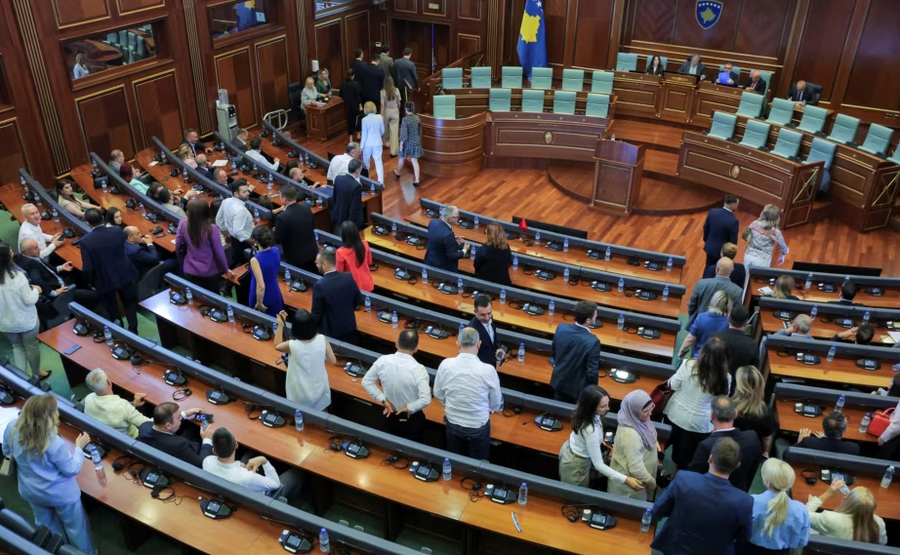
The state of Kosovo is in an undeclared state of emergency – this is how political scientist Dritëro Arifi, professor at UBT College in Pristina, describes the institutional situation in Kosovo.
According to him, this situation is a consequence of the failure of the deputies of the Assembly of Kosovo to complete the constitution of this institution by July 26.
This date marked the expiration of the 30-day deadline set by the Constitutional Court for members of the Assembly, who, according to a decision of the same court published on July 24, are prohibited from taking any decision or action regarding the constitution of the Assembly from July 27 to August 8.
Political scientist Arifi recalls that Kosovo is a parliamentary state and, while the Assembly of Kosovo is an institution that ratifies every local law and international agreement and oversees other state institutions, its dysfunction leads the country into a problematic situation.
"Most of all the relevant institutions with which a state functions – especially a parliamentary republic – depend mainly on the Assembly. So, without the votes of the Assembly, nothing functions... The state of Kosovo is in a state of emergency, except that it has not been declared. It is de facto," Arifi emphasizes in an interview with Radio Free Europe.
According to the Constitution of Kosovo, a state of emergency may be declared by the President of the country if: there is a need for emergency protection measures; there is an internal threat to the constitutional order or public security; there is a natural disaster affecting the entire territory of the Republic of Kosovo or part of it.
Radio Free Europe/Radio Liberty has contacted the Office of the President of Kosovo to ask if President Vjosa Osmani considers that the country is entering a phase of institutional dysfunction and the dangers of the current situation. As of the publication of this article, this institution has not responded.
A "no-go" situation?
The Kosovo Democratic Institute explains that the Kosovo Assembly is the main generator that sets state activity in motion, overseeing the accountability of the executive, independent agencies and other mechanisms, as well as adopting laws and ratifying various international agreements.
Vullnet Bugaqku from this institute emphasizes that as long as the Assembly remains unconstituted, the state of Kosovo is practically in an institutional blockade and currently without a way out.
"As a result of the failure to constitute the Assembly, many issues remain pending. Without a constitution of the Assembly, the state cannot normally act and function normally and fully, in terms of exercising the responsibilities and functions of each official, but also of each institution," Bugaqku emphasizes.
The current institutional blockade, according to observers of the political situation in the country, is already confronting the country with a series of consequences.
Political clashes, they estimate, are already damaging Kosovo's image in the world, presenting it as a country that lacks political stability.
Also, without a constituted Assembly that would ratify international agreements, Kosovo has not yet managed to receive pre-financing from the fund of around 880 million euros from the European Union's Growth Plan, as well as 90 million euros from the World Bank.
"State on pause"
Currently, the state of Kosovo "is on pause" and there is no signal that the situation can be resolved, Bugaqku tells Radio Free Europe.
According to him, in the absence of a constituted Assembly, the incumbent Government of Kosovo, which has limited powers, currently has no one to answer to or report to.
"When there is no Assembly, a new and legitimate government cannot be formed. Consequently, the possibilities increase for the current [incumbent government] to produce illegal and unconstitutional decisions, as well as create a kind of chaotic situation in terms of the implementation of constitutionality, but also legality in the country," Bugaqku emphasizes.
Political scientist Arifi sees the situation as unpredictable.
According to him, the failure to constitute the Assembly due to political clashes has put the country in an incomprehensible legal situation, in which, as he says, the institutions are without legitimate oversight.
"Except for the president, who has a legitimacy, even a very truncated one, because the president is elected by the Assembly... So, absurdity in itself. The only institution where accountability is given is the Parliament, and we do not have a Parliament," says Arifi.
Observers of political developments in Kosovo are now awaiting a decision from the Constitutional Court, which is expected to clarify the path towards the constitution of the Assembly after August 8.
The US Embassy in Kosovo has reacted to the failure to constitute the Assembly. It told local media that the political impasse is delaying the progress of Kosovo's aspirations and endangering the integrity of Kosovo's institutions, and called on political leaders to work to reach an agreement on the constitution of the legislative body./ REL (A2 Televizion)











